Retirement Letter To Employer
[Your Name]
[Your Address]
[City, State, ZIP Code]
[Email Address]
[Phone Number]
[Today's Date]
[Employer's Name]
[Company Name]
[Company Address]
[City, State, ZIP Code]
Dear [Employer's Name],
Subject: Retirement Letter
I hope this letter finds you well. After much consideration and reflection, I am writing to formally announce my decision to retire from my position at [Company Name], effective [Retirement Date]. It has been an incredible journey working with [Company Name], and I am immensely grateful for the opportunities, experiences, and support I have received throughout my tenure.
I have thoroughly enjoyed my time at [Company Name], and I take pride in the contributions I have made to the organization's success. The camaraderie and dedication of my colleagues have enriched my professional life, and I will cherish the memories and friendships forged during my time here.
As I step into this new phase of life, I am confident that I am leaving behind a strong and capable team that will continue to drive the company's growth and prosperity. I am committed to ensuring a smooth transition and am open to assisting in any way possible during the handover process.
I would like to express my heartfelt gratitude to you and the entire management team for the unwavering support, guidance, and encouragement you have provided me over the years. Your mentorship and leadership have been instrumental in my career development, and I am truly grateful for the opportunities I have been given.
In line with the company's policies, I will ensure all pending projects and responsibilities are effectively delegated or completed before my retirement date. Please let me know if there are any specific tasks or procedures you would like me to focus on during this transition period.
Moreover, I am open to attending a retirement farewell, should the company plan one, to bid farewell to my colleagues and express my gratitude to them.
As I step into retirement, I am excited to embrace new passions, spend more time with my family, and explore different avenues for personal growth. I am optimistic about the future and the opportunities it holds.
Once again, thank you for everything. I will always cherish the memories of my time at [Company Name], and I wish the company continued success and prosperity in the years to come.
If there are any formalities or paperwork necessary for the retirement process, kindly let me know, and I will promptly fulfill them.
Please feel free to reach out to me at [Email Address] or [Phone Number] should you have any questions or require any assistance.
Thank you for your understanding and support during this significant life transition.
Sincerely,
[Your Name]
Formal Retirement Letter
Subject: Notice of Retirement
Dear [Manager's Name],
I am writing to formally notify you of my retirement from [Company Name], effective [last working date]. After [number of years] of dedicated service, I believe this is the right time to step into the next chapter of my life.
I am truly grateful for the opportunities I have had during my time here, from professional growth to the relationships I have built with colleagues. I have learned much and contributed my best to the organization.
Please let me know how I can assist in ensuring a smooth transition, whether through training a successor or wrapping up ongoing responsibilities. It is important to me that my departure is handled professionally and leaves no disruptions.
Thank you once again for your guidance and support. I wish the company continued success.
Sincerely,
[Your Name]
Heartfelt Retirement Letter
Subject: Retirement Announcement
Dear [Manager's Name],
It is with mixed emotions that I write this letter to announce my retirement, effective [last working date]. While I am excited to embark on a new phase of life, it is difficult to say goodbye to a workplace that has become like a second home.
Over the years, I have been fortunate to work with incredible colleagues, mentors, and leaders who have shaped my career and enriched my personal life. I will always cherish the memories of collaboration, challenges, and achievements we shared.
I am committed to ensuring a smooth handover and will do everything necessary to make the transition seamless for the team.
Thank you for being an integral part of my professional journey. I will always hold this chapter of my life close to my heart.
With deep gratitude,
[Your Name]
Casual Retirement Email
Subject: Retirement Plans
Hi [Manager's Name],
I wanted to let you know that I’ve decided to retire, with my last day being [last working date]. It’s been an amazing ride at [Company Name], and I’ve truly enjoyed working here.
I appreciate all the support and encouragement I’ve received. I’ll make sure to help with the transition and hand over my duties smoothly.
Thanks again for everything — it’s been a wonderful experience, and I’ll miss the team.
Best wishes,
[Your Name]
Quick Retirement Notice
Subject: Retirement Notice
Dear [Manager's Name],
I am writing to inform you of my retirement from [Company Name], effective [last working date]. I am thankful for the opportunities I have had during my career here.
Please advise me on the next steps for finalizing the retirement process.
Sincerely,
[Your Name]
Funny Retirement Message
Subject: Hanging Up My Work Boots
Dear [Manager's Name],
After [number of years] of loyal service, countless cups of coffee, and way too many meetings, I’ve decided it’s finally time to retire! My last working day will be [last working date].
I promise to hand over my tasks responsibly, though I can’t guarantee I won’t sneak away early a few times to “practice” being retired. Thank you for making this workplace such a fun and rewarding environment.
I look forward to the next chapter — one with no alarms, no deadlines, and hopefully more sunshine!
Best regards,
[Your Name]
Provisional Retirement Letter
Subject: Tentative Retirement Notice
Dear [Manager's Name],
I would like to provide you with provisional notice of my intention to retire, tentatively scheduled for [proposed date]. While the exact timing may depend on personal circumstances and project completions, I wanted to ensure the company has enough lead time to plan accordingly.
I am committed to working with you on a smooth transition, including training and knowledge transfer for my replacement. Once I finalize the details, I will provide a confirmed retirement date.
Thank you for your understanding and continued support.
Best regards,
[Your Name]
Happy Retirement Email
Subject: Excited to Announce My Retirement
Dear [Manager's Name],
I am excited to share the news that I will be retiring from [Company Name], with my last day scheduled for [last working date]. It feels like the right time to celebrate a fulfilling career and begin the next joyful chapter of my life.
I am deeply appreciative of the opportunities and experiences I’ve had here. Working with such an amazing team has been an honor, and I will miss the camaraderie.
Let’s stay in touch — I’d love to hear about the continued successes of the company even after I step down.
Warm regards,
[Your Name]
Serious Retirement Letter
Subject: Retirement Notification
Dear [Manager's Name],
This letter serves as my official notice of retirement from [Company Name], effective [last working date]. After considerable reflection, I have decided this is the appropriate time to conclude my professional career.
I have greatly valued the opportunities provided to me and take pride in the contributions I have made to the organization. I am prepared to work with you in ensuring a responsible handover of my duties.
Please consider this as the beginning of the formal retirement process. Kindly advise me on the necessary administrative steps.
Respectfully,
[Your Name]
Why do you need a retirement letter to your employer?
A retirement letter is a formal way of announcing your decision to leave the workforce.
It provides clear communication of your intended last day, expresses appreciation, and begins the transition process.
Without it, your departure may lack professionalism and create confusion for both the employer and HR.
Who should send the retirement letter?
- The employee planning to retire should send the letter.
- It should come directly from the person leaving, not a representative.
- For senior executives, sometimes a PA or HR assistant drafts it, but it is always signed by the retiree.
When should you write a retirement letter?
- Typically 2–6 months before the planned retirement date.
- Earlier if you hold a senior or specialized role that requires extensive transition.
- Immediately after deciding to retire, so the company has enough time to prepare.
How do you write and send a retirement letter?
- Start with a clear subject line announcing retirement.
- Include your intended last working day.
- Express gratitude and highlight positive experiences.
- Offer help with the transition.
- Keep the tone professional, but adjust it depending on your relationship with your employer.
- Deliver it formally in writing or via email, depending on company culture.
What are the common mistakes to avoid in retirement letters?
- Being vague about the retirement date.
- Forgetting to thank the employer and colleagues.
- Making negative remarks about the company.
- Writing too casually when a formal tone is expected.
- Not offering to assist in transition.
What elements and structure should a retirement letter include?
- Subject line or opening sentence announcing retirement.
- A statement of your final working day.
- Words of appreciation for opportunities and experiences.
- Offer of help with the transition.
- Closing statement and signature.
After sending the retirement letter, what should you do?
- Follow up with HR to complete paperwork (pension, benefits, clearance).
- Meet with your manager to discuss transition.
- Assist with training your replacement if needed.
- Prepare for exit interviews if scheduled.
- Stay professional until your final day.
Pros and cons of writing a retirement letter
Pros:
- Professional closure to your career.
- Leaves a positive impression.
- Provides official documentation of retirement.
Cons:
- May feel formal or restrictive in tone.
- Requires careful wording to avoid misunderstandings.
Tricks and tips for writing a retirement letter
- Be concise but heartfelt.
- Keep the tone consistent with company culture.
- If unsure, use a formal structure.
- Avoid overexplaining reasons for retirement.
- End on a positive note.
Does a retirement letter require attestation or authorization?
In most cases, no attestation is required.
However, some companies may require HR verification or management approval for record-keeping.
For government or pension-linked roles, official authorization may be necessary.

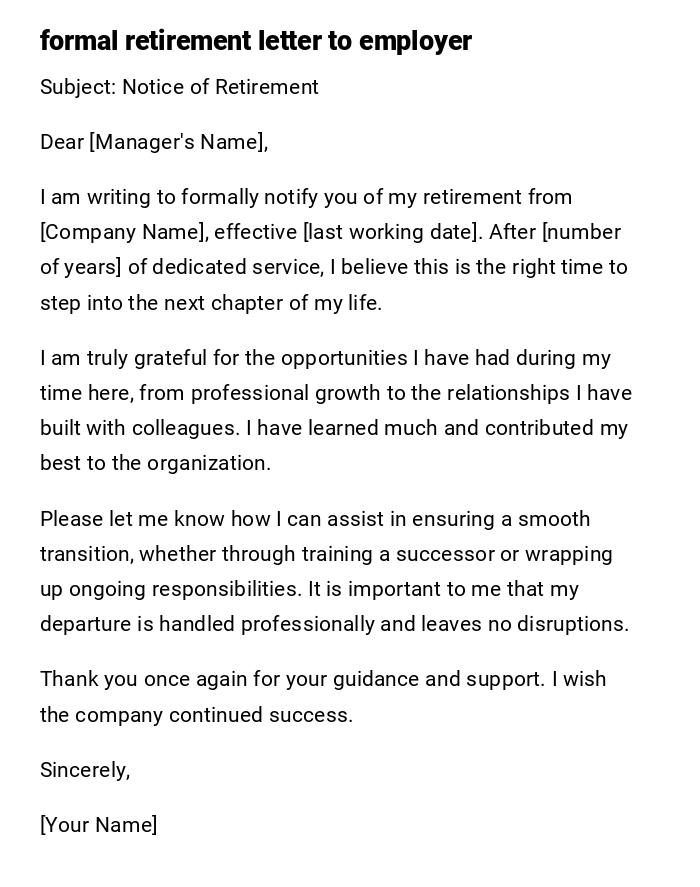
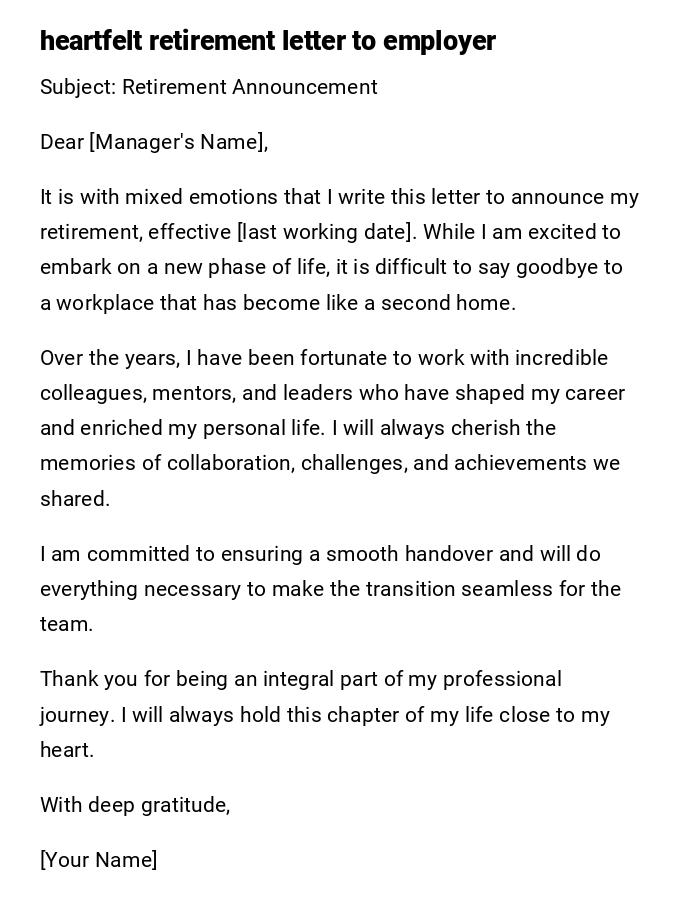
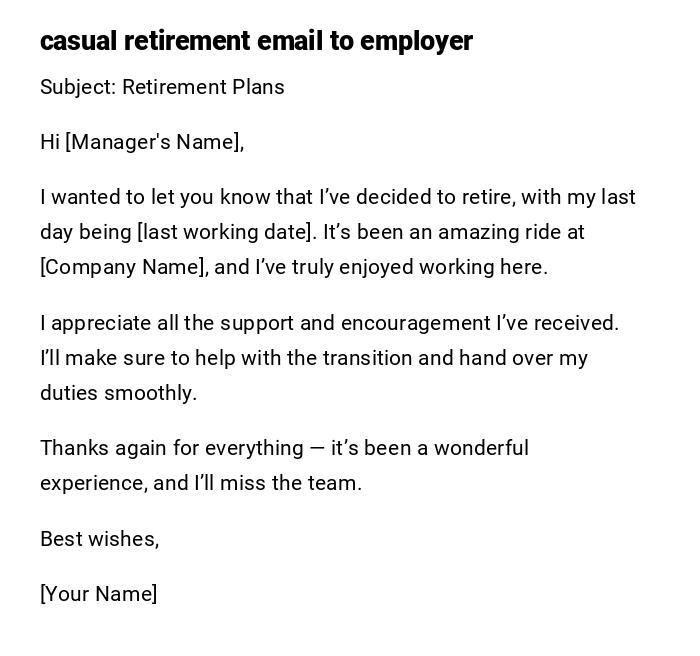
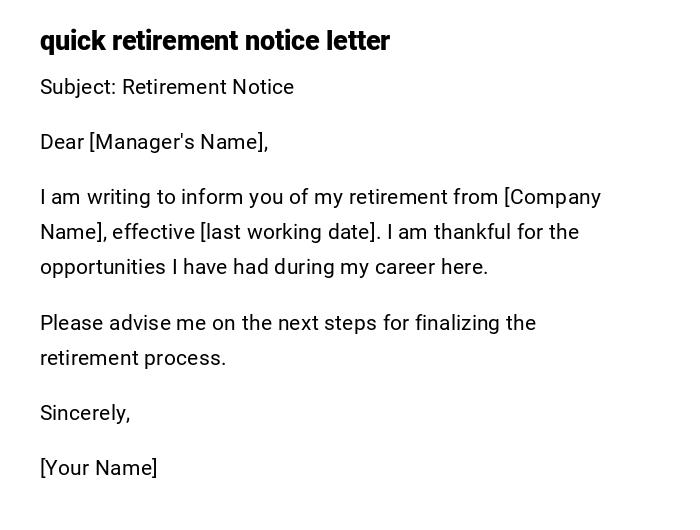
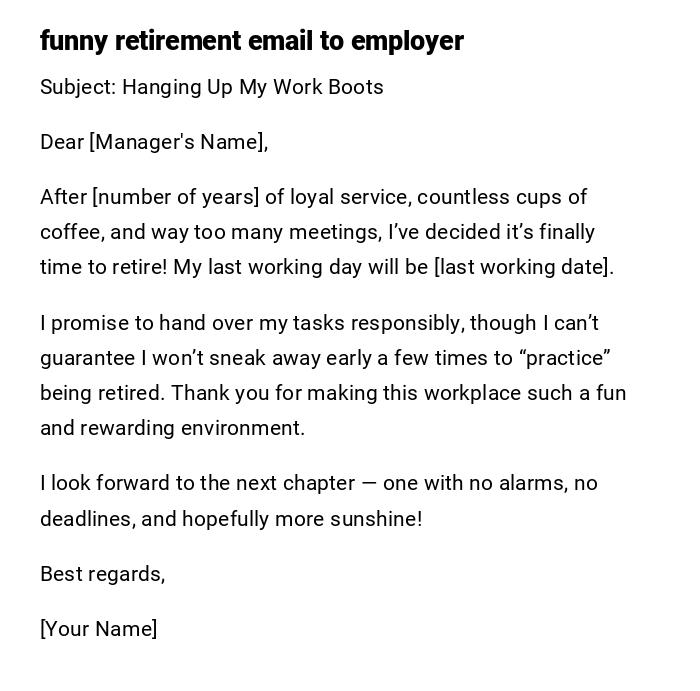
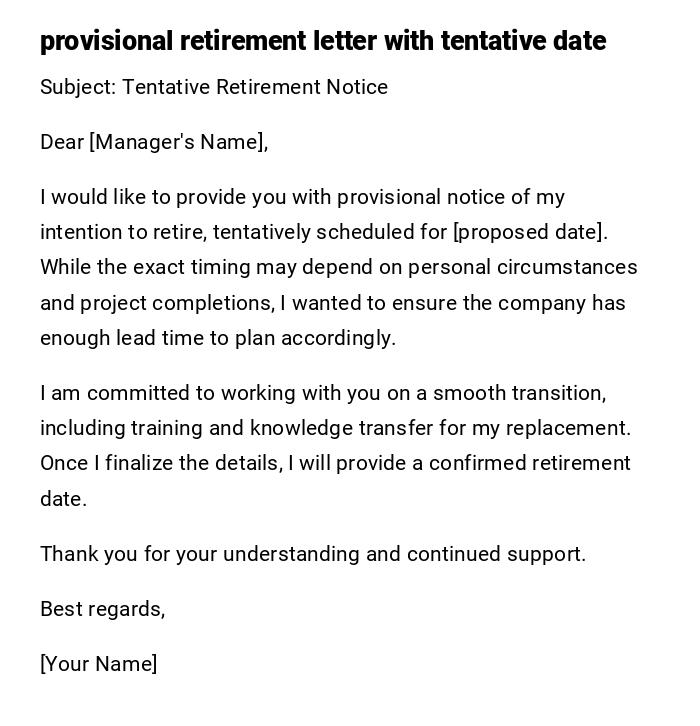
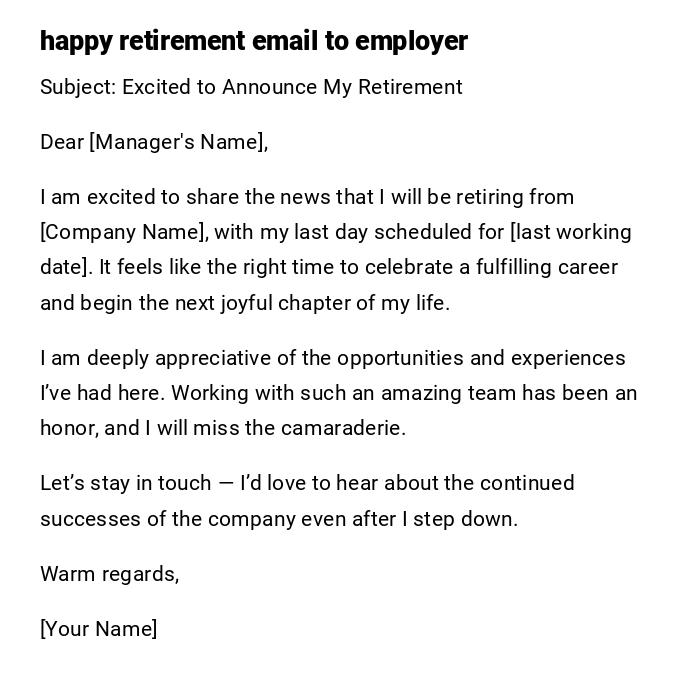
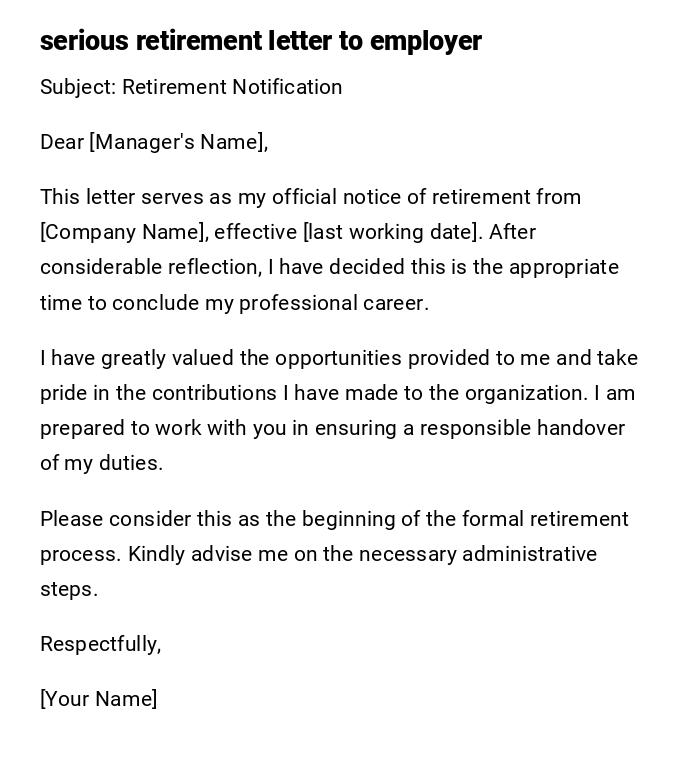

 Download Word Doc
Download Word Doc
 Download PDF
Download PDF